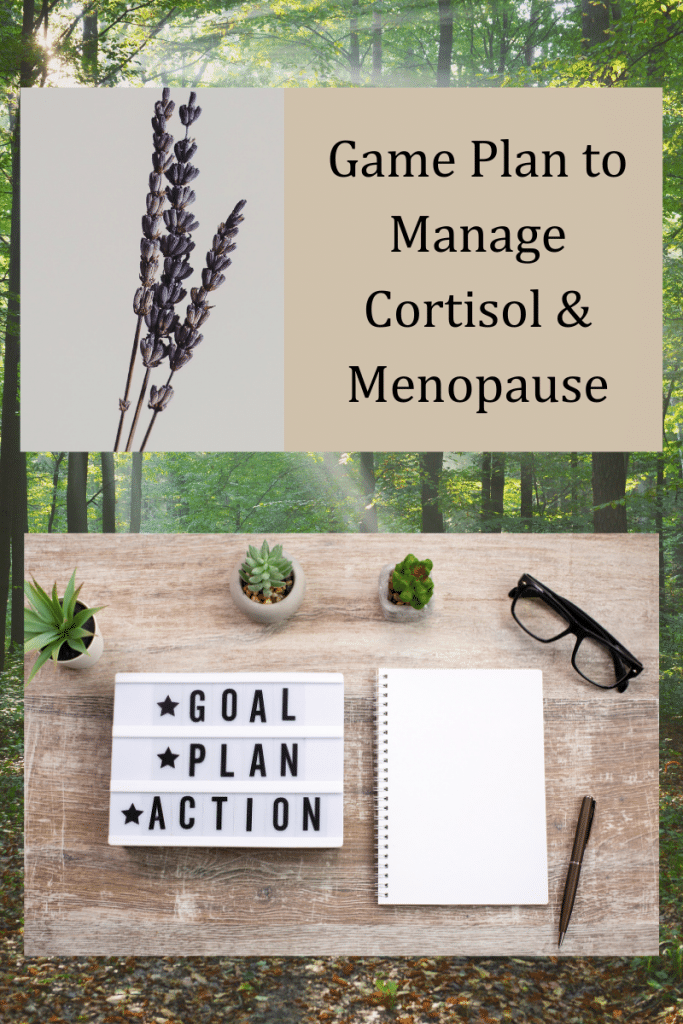How to Reduce Cortisol in Menopause
Have you wondered about the link between the stress hormone and menopause? Today, we are are to to discuss this connection and much more!
Table of Contents
First, let’s talk about the relationship between cortisol and menopause. And then we will move on to cortisol levels in women.
Menopause and Cortisol
There has been a lot of discussion in recent years about the “stress hormone” cortisol, and one of the more recent topics includes how menopause affects it.
Cortisol, our primary stress hormone, is secreted by the adrenal glands and activates our “fight or flight” response to help us act quickly to be safe from a dangerous situation. Think about a tiger chasing you being the stressful event.
During this event, our body may control processes to help us get out of danger quickly. We break down places where we store body fat to have it available to run fast, and we also crave foods to help us have the energy that we need to get away from the stressful event.
Another thing that we know is that it takes time to come off that stress. For me, sometimes coming off the stress is more difficult than being in the moment with it. And for many of us, it seems like we are in a continuous, long-term stress, and that stress that many people are constantly under can lead to long-term inflammation, which is linked to chronic disease, higher levels of cortisol, and increased insulin resistance.
And when we are in perimenopause or menopause during a time of hormone fluctuation, this also affects cortisol levels. Let’s take a moment to talk about how this works.
How Do Hormone Changes Affect Cortisol and Perimenopause?
But during menopause, when your other hormones like estrogen and progesterone are fluctuating, this can affect how the way your body handles stress, too. As you already know, menopause can be a stressful and anxious time, and in addition, hormonal shifts, which can increase stress responses, can lead to higher cortisol levels. So cortisol levels and menopause have an important balance.
And during long periods of stress, the body prioritizes making cortisol, and estrogen may take a back seat. This may lead to low estrogen and cortisol levels that are high which can increase menopausal symptoms like weight gain, mood changes, sleep issues, and feeling tired.
Understanding more about this connection can be your secret weapon for finding balance and feeling your best in midlife!
Do Women Have Cortisol Hot Flashes?
Can high cortisol cause hot flashes?
Yes, in addition, constant stress with high cortisol and menopause symptoms that feel increased is not unusual. And that includes hot flashes!
Is there a relationship between high cortisol and night sweats?
Yes, it can. As we begin producing less estrogen in our ovaries, our adrenal glands try to take up the slack by producing progesterone and estrogen, but if you are under constant stress, your adrenals have to compete with producing cortisol to manage the stress, so the other hormones have to take a back seat.
Since the journey through perimenopause and menopause may already feel like a rollercoaster with hot flashes, restless nights, and mood swings, it is already a lot! We often blame it on estrogen and progesterone, but cortisol may exacerbate these symptoms.
What Are Some Signs of High Cortisol in Women
Some of the signs of High Cortisol in women may include:
- Difficulty sleeping due to stress, which can increase hot flashes and night sweats, which can wake us up. In addition, it can interfere with the melatonin and cortisol cycles.
- Weight gain around the belly. This is common as women’s hormones change, but it is also common to gain weight in the middle from too much cortisol. This weight around the belly can increase the risk of chronic health conditions like diabetes and heart disease because of increased inflammation.
- Increased anxiety and mood swings because of a hormone imbalance.
- Suppressed immune system due to elevated stress and cortisol. Around menopause is a time in a woman’s life when they are at more risk for autoimmune disease because of hormone imbalances, increased belly fat, and stress.
- Brain fog and mild cognitive complaints.

Menopause Cortisol Weight Gain
Cortisol, Menopause, And Weight Gain
Cortisol and weight gain in menopause are frustrating because it feels like we can’t shed those extra pounds around our middle, no matter what we do. As I mentioned before, menopause hormone fluctuations make losing weight around our middles extremely difficult.
That compounded with high cortisol levels, which can signal to our bodies to store fat, particularly in the abdominal area. Cortisol and belly fat can go hand in hand.
The other thing that can happen during chronic stress is that we are more likely to crave sugar and fatty foods. This is because during times of “fight or flight,” our body is trying to protect itself to adapt to stress by increasing energy stores.
Cortisol’s Role in Chronic Stress and Inflammation
Does cortisol cause inflammation?
Yes, it can if the stress is long-term. Generally, short-term stress, lasting a few minutes or hours, usually does not.
When stress hormone imbalance involves weeks, months, and years, this chronic stress can lead to additional health conditions. This long-term stress response can be quick to activate but can become less responsive. Some of these include diabetes, heart disease, and a decreased immune system.
Can stress cause more imbalance due to stress than menopause changes alone?
Yes, it can exacerbate the issues due to natural life cycle changes.
5 Essential Ways to Manage Cortisol and Menopause
How to Lower Cortisol Naturally
Now that you know the things that can happen with high levels of stress and cortisol in menopause, let’s make a plan to help reduce our stress so we can reduce chronic cortisol levels.
Things That Make a Difference: Reducing Chronic High Cortisol Levels
- Mindful Exercise
- Eating Cortisol-Reducing Foods
- Getting Restful Sleep
- Using Stress Management Techniques & finding meaningful connections with other people.
- Reduce alcohol to no more than one drink a day and don’t use tobacco
Below, I will talk about all of the steps, and I will talk about how you can make a plan to work on these lifestyle changes.

Best Workouts for High Cortisol
How Does Exercise Affect Cortisol Levels?
This article from Shape Magazine is a great resource for exercise ideas to help reduce stress and lower cortisol levels! I love that it shares a reminder that not only does stress affect the brain, but also the body.
This article mentions that for some people, exercise is a good way to relieve stress, but for some of us, especially if it is high intensity, exercise may increase cortisol levels.
So, for many of us who are feeling high stress, especially around bedtime, some of the best exercises for night cortisol levels would be relaxing, mindful stretches, or breathing.
Some of the best workouts for high cortisol during the day may include:
Move with Intention: Find a form of movement that feels good, not punishing.
Gentle Movement: Gentle yoga, stretching, and walking are fantastic for lowering cortisol.
Listen to your body: On days you feel depleted, an intense workout might not be what your body needs. Opt for a restorative walk in nature instead.

Adding Some Cortisol-Reducing Foods
Here Are Nutrition Tips to Help You Reduce Cortisol Levels:
Nourish your adrenal glands! Your diet is the foundation!
- Focus on whole foods: Load up on colorful vegetables, healthy fats (avocados, nuts, olive oil), and lean proteins. These provide the building blocks your body needs.
- Balance your blood sugar: Eating regular meals with a mix of protein, fiber, and healthy fats prevents blood sugar spikes and crashes, which can trigger a cortisol release.
- Hydrate Yourself: Dehydration is a stressor on the body. Keep a water bottle with you and sip throughout the day.
Cortisol-Reducing Foods
In addition, I think that this article from Prevention Magazine has great, additional information on ways to help you reduce cortisol levels:
- Eggs: Because they are rich in tryptophan, which is a precursor to serotonin, and this helps reduce cortisol.
- Fermented foods can help gut health, and a healthy gut is linked to lower stress.
- Salmon and avocado are rich in healthy fats, which can help reduce inflammation and improve cortisol.
- Bananas and spinach are rich in magnesium, which may also play a role in reducing cortisol.
Cortisol-Increasing Foods
These foods tend to increase both cortisol and inflammation. They include trans fats, sugary, processed foods, and caffeinated drinks.

Get Some Restful Sleep
Stress and Sleepless Nights
Work towards managing the cortisol sleep-wake cycle. Cortisol levels should normally decrease at night to allow us to sleep deeply. But chronic stress keeps these levels high, leading to those frustrating nights of tossing and turning. This creates a vicious cycle where stress disrupts your sleep, and this stress, with the lack of sleep, increases cortisol even more.
Try creating a sleep sanctuary. Make your bedroom a peaceful haven. Turn off screens an hour before bed and create a relaxing routine.
Being under a significant amount of stress, I have had more than my share of sleepless nights, so I have been a collector of sleep hygiene ideas. Here are some that have really helped improve my sleep.
I occasionally have a bad night, but it has improved tremendously!
Stress Management
We can’t totally remove stress from our lives, but we can learn to include more joy and relaxation. We can manage stress by building more resilience and giving our bodies the support that they need to handle the stressors of life better.
Embrace Stress-Reducing Rituals: This is where we put ourselves first. Practice mindfulness: Even 5 minutes of deep breathing or a guided meditation can shift our nervous system out of “fight or flight.”
Connect with Ourselves: Journaling, reading, or simply sitting quietly with a cup of tea can help us tune into what our bodies need.
What do you like to do to manage stress?
For me, it is a walk in the woods or a little arts and crafts. Or talking with someone I love!
It makes sense if I am up at night trying to solve life’s problems, in addition to sleep tips, I might also have some stress management ideas.
Limit Alcohol and Nicotine
Research has shown that chronic alcohol use and nicotine can also increase cortisol levels.
Make Your Long-term Game Plan to Manage Cortisol and Menopause
Now that we are more aware of how to manage cortisol and menopause, let’s create a 3-Step Action Plan for a healthier you! Let’s talk about each step.
How to Work on Goals to Help Relieve Menopause and Cortisol Symptoms:
- Pick one or two areas where you can start to work.
Let’s say that you want to work on your sleep and stress. (You can pick any of the 5 ways to reduce cortisol. - Next, set a behavior change goal for each.
For example, for sleep, perhaps I decide that I will turn off my electronic devices one hour before bed and either take a hot bath or read a book. (Maybe this would be my goal for both sleep and stress management.
Or I could set an additional goal to take a 30-minute walk after work to destress before I start my evening routine. - Evaluate how it went.
If it went well, you could stick with this goal for several weeks until it became a habit, before setting a new goal, or you could also add a no-goal.
What if it did not go as planned? Try to find out why and include a way to reduce the challenges or barriers to succeed, or you could even set a different goal. Maybe you weren’t ready for the previous goal yet, but later down the road, you might be.
Menopause is a natural transition, and by understanding how your hormones work together and how women’s cortisol levels work, you can make informed choices to support your body. These techniques that I shared can help you be more resilient to stress!
In addition to this article on cortisol and menopause, this week, I have also put together a newsletter on Substack on how vitamin D and cortisol work together to keep us at our best health.
I have also put together a new Course on hormones and health called the Midlife Glow More, which will be available in November! This is Part Two of a two-part series. In Part One, the Midlife Glow, the focus is on estrogen, progesterone, and testosterone.
Whereas part two covers cortisol and many more hormones that also change during middle age, and how we can change our lifestyle to make our hormones work their best!


